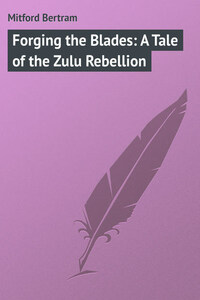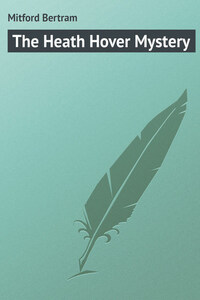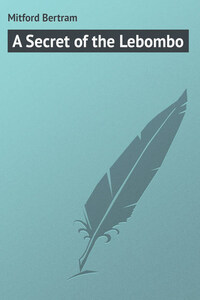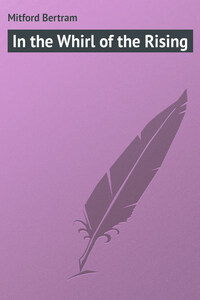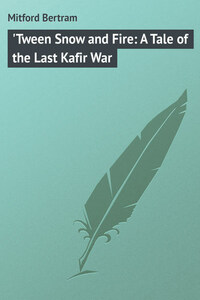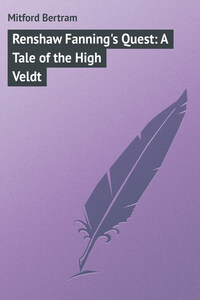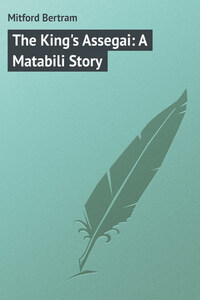The river swirled on through the heat, the sweltering, fever-breathing heat. The long, deep reach made but scant murmur, save where the boughs of a luxuriant vegetation dipped on its surface. Above, on either hand, masses of rolling verdure, tall forest trees, undergrowth in rich profusion, and, high up against the blue sky, battlemented rock walls.
Two dark objects relieved the shimmering smoothness of the surface of the reach – two minute dark objects to the ordinary observer, afloat, motionless. Yet why should these remain motionless instead of floating down with the fairly strong, though smooth, current? Well, there might have been, behind each, about twelve feet of ugly, scaly saurian, whose powerful under-water stroke kept them stationary, while watchful, against the descending stream.
A grassy glade slopes down to the bank, tailing away inland into a path something like a “ride” in an English game covert. Great trees, rising overhead, shade this, in a dimness which shuts out, save in a faint network, the glare of the molten sun. And it is at present occupied by two horses and a man.
The horses still have their saddles on, though the girths are loosened. The animals are grazing, their bridles trailing on the ground. Suddenly both throw up their heads and snort, then walk quickly away, further up the forest path. The man, who is standing up, gazing meditatively out upon the river reach, notices this and turns. Then he advances a step or two, and halts suddenly. For there is a movement in the grass a few yards in front, and immediately from this rises the head and neck of a large green mamba.
Instinctively the man’s hand goes to his revolver, then he pauses. The snake is hissing viciously. More of the long neck appears, waving to and fro as though preparing for a spring. This is a peculiarly fierce and aggressive species when disturbed, and the man knows it. He knows also that the chances of being able to stop its rush with a bullet are small. He abandons the firearm and starts another plan.
He begins whistling in a low but peculiarly clear note. The effect is magical. The angry, excited waving of the sinuous neck ceases. The head, still raised, is motionless as though under some new and enthralling influence. Clearly on the part of its owner hostilities are suspended.
He sustains the spell. Tune after tune trills forth in that clear note, and the reptile, its deadly head still raised, its original fury dulled to an almost placid expression, still listens. To the performer the position now seems ridiculous, then rather interesting. He has never set up as a snake-charmer before. For now, indeed, the horror with which the much dreaded reptile had inspired him has given way to a subtle sort of sympathy. He no longer fears it. He seems to have tamed it, and feels accordingly. It is a strange and appropriate picture: the man and the dreaded serpent, the dim shadowing away of the tangled forest, the two horses snuffing with uneasy curiosity in the background, the river reach, still and deep-flowing, with the muzzles of its two voracious denizens causing a light ripple on its surface.
All thought of destruction has faded from the mind of the human actor in this weird performance. He continues to evolve his natural music, even advancing a few steps nearer to his grim listener. The latter shows no sign of fear or resentment. Then an interruption occurs.
Crash! The motionless, uplifted neck of the serpent seems to fly nearly in half, and the great coils beat and burst convulsively in the grass. The man turns. Another man is standing behind him holding a shotgun, one barrel of which is still smoking.
“What the devil did you do that for?” says the first angrily.
The other laughs, a thick sort of laugh, and by no means a pleasant one.
“Do that for?” he echoes, speaking with somewhat of a Jewish tone and accent. “Can’t I shoot a blighted snake without having to ask your leave?”
“You idiot. I was in the thick of a most interesting experiment, and you’ve spoilt it all by your infernal and officious interference.”
“Interesting experiment? I call it disgusting.”
“Here, drop that gun sharp, or I’ll blow your head into the river.”
The Jewish-looking man with the shotgun starts. The other’s revolver is pointing right at his chest, and there is no mistaking the determination in his steely eyes. He knows full well that there is every reason why his life is in mortal peril. So he drops the gun sullenly into the grass.
“Now, then. Take five steps back from it. If you move otherwise you’re dead.”
There is no alternative but to obey, and this the threatened one does.
“Don’t know if you’ve gone mad,” he says. “Fooling with snakes must have sent you off your chump, I reckon.”
“Do you? Well, you chose to fasten yourself on to me for your own purpose – to wit, blackmail. Now you are going to write down, here and now, something which will put it out of your power to try any more blackmail on me for ever.”
“I’ll see you damned first. I’ll see you damned before I write anything.”
